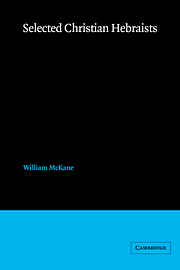Book contents
- Frontmatter
- Contents
- Preface
- List of abbreviations
- Introduction
- 1 The foundations
- 2 Andrew of St Victor
- 3 William Fulke and Gregory Martin
- 4 Richard Simon
- 5 Alexander Geddes
- Conclusion
- APPENDICES
- Notes
- Select bibliography
- General index
- Index of modern authors
- Scripture references
- Index of early Christian Literature
- Frontmatter
- Contents
- Preface
- List of abbreviations
- Introduction
- 1 The foundations
- 2 Andrew of St Victor
- 3 William Fulke and Gregory Martin
- 4 Richard Simon
- 5 Alexander Geddes
- Conclusion
- APPENDICES
- Notes
- Select bibliography
- General index
- Index of modern authors
- Scripture references
- Index of early Christian Literature
Summary
Richard Simon (1638–1712) combines critical boldness with Catholic conservatism. He shares with Gregory Martin the view that vernacular translations of the Bible should be made from the Vulgate and that attention should be focused on the definitions of the Council of Trent. The differences between them are more striking and Simon is intellectually adventurous in ways which set him at a great distance from Martin.
There are two principal respects in which Simon cast doubt on Fulke's description of the vocalized text of the Hebrew Bible as the ‘first fountain’, one critical and the other theological. On the critical front he advanced the claims of the Septuagint. The most significant critical observation which he made was not that the Hebrew text which was translated by the Seventy differed quantitatively from the text of the Hebrew Bible. Simon's point was rather that where the consonantal texts were identical, the vocalization of the Seventy sometimes differed from that of the Hebrew Bible. The consonantal text has to be interpreted (vocalized) before it is translated and different interpretations can be offered. When the Seventy indicate a different vocalization of the Hebrew from that of the Hebrew Bible, is it the vocalization of the Seventy or the vocalization of the Massoretes which gives access to the ‘first fountain’? Fulke's idea which seemed so fundamental and untroubled by ambiguity lost some of its sharpness.
On the theological side Fulke's view that a competent translation of the Bible gives access to the mind of the Holy Spirit is countered by Simon.
- Type
- Chapter
- Information
- Selected Christian Hebraists , pp. 111 - 150Publisher: Cambridge University PressPrint publication year: 1989
- 1
- Cited by

